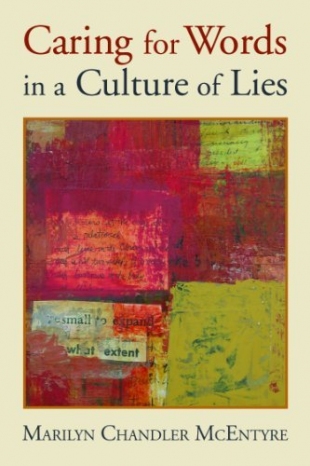Marilyn Chandler McEntyre writes and teaches in southern California. A longtime professor of English and a frequent contributor to Weavings, she has written three books of poetry on the art of Vermeer, Rembrandt, and Van Gogh; we reviewed the last one, The Color of Light.
In this sobering and timely new book, McEntyre correctly points to the distorted meanings, the smear campaigns, the talk radio show rants, the pollution and trivialization of the language, the broken promises, and the lies which are rampant in American culture today, presenting a much-needed wake-up call outlining 12 ways (she calls them "strategies of stewardship") we can retrieve and revive our "precious language resources." At the very least, we must deepen and sharpen our reading skills; cultivate more precise and clear habits of speaking and listening; and practice poesis — to be makers and doers of the word. Anyone who is fed up with the omnipresence of words such as "whatever," "cool," and "awesome" will appreciate this salutary tome!
McEntyre loves words. She savors their richness, musing on the word "felicity" and lamenting the disappearance of grand old words such as "proper," "prudent," "sensible," "noble," "honorable," and "merry." In her essay "Tell the Truth," she quotes Flannery O'Connor's line" "You shall know the truth, and the truth shall make you odd." Included here is a glimpse of the term "collateral damage "in wartime — used to cover up the twisted and torn bodies of civilian men, women, and children. In these days of lies and deceptions by corporate executives, Wall Street traders, politicians, teachers, and students, it's hard to discern the truth. In a section called "Stay in Conversation," McEntyre shares some cogent suggestions for better listening skills (see the excerpt).
We also appreciated the author's list of the great storytellers among us now; the value of reading and memorizing poetry; the exploration of wordplay as a pleasurable and worthwhile pursuit; the importance of prayer as the practice of the presence of God; and the need for silence — McEntyre praises Samuel Beckett for making places in his plays for silence. Then she concludes:
"We need that challenge, and the best of our artists offer it, finding inventive ways to open up and clear interior spaces, weaving words around what cannot be said, ringing the silences we avoid with chant, plainsong, the ding of a Tibetan chime, giving shape to the silence so that we may recognize it not as a void or abyss but as a place to lie down in green pastures and be restored.
"They trace paths for us to the threshold of unspeakable mystery. There we lay down our pens and swords, and the rest is silence. Silence is the Sabbath we need. In silence we take our rest."
